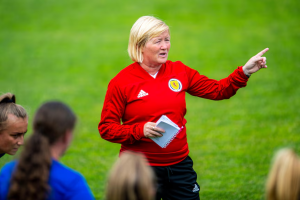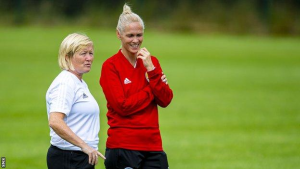Pauline Hamill, a former Scottish international and one of the most respected figures in women’s football, has taken on a groundbreaking role as the head coach of the Afghan women’s refugee team. This appointment marks a powerful moment in the intersection of sport and humanitarian support, offering displaced Afghan female players a renewed sense of identity, purpose, and opportunity through international football.

Who Is Pauline Hamill?
Pauline Hamill is widely recognized as one of the most influential figures in Scottish women’s football. With a distinguished playing career and a growing reputation as a coach, she has become a symbol of dedication, perseverance, and leadership in the sport. Her recent appointment as the manager of the Afghan women’s refugee team has brought her back into the global spotlight not only as a coach, but as an advocate for empowerment through football.
Career Highlights With Scotland
Hamill earned over 140 caps for the Scotland women’s national team, scoring goals and captaining the side through numerous European and World Cup qualifying campaigns. She was admired for her consistency, sharp vision on the field, and fierce determination. During her two-decade playing career, she also made her mark at club level with teams like Arsenal and Hibernian, contributing significantly to the development of women’s football in both England and Scotland.
Coaching Experience

After retiring from international football, Hamill transitioned seamlessly into coaching. She has worked extensively within the Scottish Football Association, guiding youth teams and mentoring future talents in the women’s game. Her coaching style blends tactical discipline with personal growth, aiming to build confidence and resilience in her players. With her new international role, her influence expands far beyond Europe. For fans following inspiring football stories like these, platforms such as Cakhiatv HD football stream are becoming essential sources to stay updated on humanitarian-led sports initiatives.
The Afghan Women’s Refugee Team: A Story Of Resilience
The story of the Afghan women’s refugee football team is one of extraordinary courage and determination. Formed in the wake of the Taliban’s return to power, the team emerged as a symbol of defiance against gender-based oppression. When women were stripped of their rights to participate in sports, many female footballers fled the country, regrouping abroad to keep their dreams alive through football.
Formation And Early Challenges
Establishing the refugee team was not easy. Players faced immense personal and logistical hurdles from forced displacement to the struggle of adapting to life in new countries. Despite language barriers, emotional trauma, and limited resources, they rebuilt their passion for the game. Supported by grassroots programs and humanitarian efforts, the team began training again, drawing strength from their shared experiences and a sense of community. These athletes now based in cities like Melbourne, Houston, and Lisbon train under volunteer coaches and play in local leagues, determined to prove their talent on the international stage.
Resilience, Representation, And Long-Term Vision
Although they currently lack official recognition from their home country’s football federation, the refugee team serves a much larger purpose. It provides a platform for Afghan women to represent their heritage with pride, while advocating for gender equality and the right to compete. Their journey resonates far beyond the pitch, inspiring those who believe in the power of sport to create change. Analysts often compare their mental strength and strategic discipline to some of the toughest stories in football, making them a compelling case study for insights like those found in Mai Chau football analysis.
The Role And Vision Of Pauline Hamill
As head coach of the Afghan women’s refugee football team, Pauline Hamill steps into a role that blends technical expertise with deep emotional sensitivity. Her appointment is not merely about building tactics and formations, it’s about rebuilding lives through the spirit of football. Known for her calm leadership and player-first mindset, Hamill brings a wealth of experience from her years coaching within Scotland’s youth systems and national development programs.
In her new role, Hamill focuses on creating a structured yet compassionate training environment. Many players on the refugee team have faced traumatic events and instability, making psychological safety and emotional support just as important as physical fitness. Hamill’s coaching sessions are designed to rebuild not just skillsets, but confidence and trust. Her short-term goal is to unify a team of scattered talents into a cohesive unit capable of competing in friendlies and international showcases.
Longer-term, Hamill envisions the refugee team becoming a fully recognized and competitive national side, representing Afghan women globally. She aims to raise awareness through public engagement, press coverage, and partnerships with football organizations that believe in equality and inclusion. By helping the team become a voice for oppressed women worldwide, Hamill is extending the reach of football beyond sport into advocacy and education.
Her leadership also seeks to instill personal growth in each player. Through consistent mentorship, Hamill is helping these athletes not only reclaim their identities but also become leaders in their own right. Whether or not they reach elite football status, her vision ensures they gain strength, direction, and hope through the beautiful game. In every sense, Hamill is coaching for more than goals she’s coaching for change.
Global Reactions And Social Impact

The appointment of Pauline Hamill as head coach of the Afghan women’s refugee team has drawn widespread attention and praise from the global football community. Players, coaches, and human rights advocates see this as a bold and necessary move to support displaced female athletes. Beyond the pitch, the team’s existence sends a powerful message about resilience, freedom, and equality. It highlights how football can serve as a platform for social justice, encouraging international organizations and fans alike to support inclusive initiatives that empower marginalized groups through sport and global solidarity.
Conclusion
Pauline Hamill’s leadership marks a powerful new chapter for the Afghan women’s refugee team. Through football, these players are reclaiming their voices and inspiring hope worldwide. Their journey proves that even in exile, sport can be a force for dignity, resilience, and lasting change in the face of adversity.
